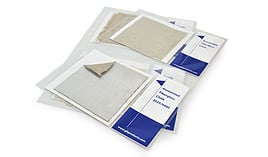The types of insulation used in commercial and industrial settings usually contain one or more of the following materials. Our industrial insulation specialists know the importance of having valuable information before making a choice. The materials featured here are used extensively across a number of industrial and commercial insulation applications.
- Calcium silicate is a granular insulation made of lime and silica, reinforced with organic and inorganic fibers and molded into rigid forms. Service temperature range is 80°F to 1200°F (26.6°C to 648.9°C). It offers good flexural and compression strength. Although calcium silicate is water absorbent, it can be dried out without deterioration. This material is noncombustible and used primarily on hot piping and surfaces. Due to the brittle nature of Calcium Silicate some type of field applied jacketing is required.
- Mineral fiber also known as Mineral Wool or Stone Wool is available in the forms of flexible blankets, rigid boards, pipe insulation, wicking pipe insulation, and other premolded shapes. Service temperature range is 0°F to 1800°F (-18°C to 982°C). Insulation made of mineral fiber has a nearly neutral pH. It is noncombustible or of limited combustibility and offers good sound absorption qualities.
- Expanded Perlite is made from an inert siliceous volcanic rock combined with water. When heated, the water vaporizes and the rock volume expands. This creates a cellular structure of minute air cells surrounded by vitrified product. Added binders help it resist moisture penetration and inorganic fibers reinforce the structure. The material has low shrinkage and high resistance to substrate corrosion. Perlite is noncombustible and is suitable for use in the intermediate and high temperature ranges. Expanded Perlite insulation is available in rigid preformed shapes and blocks.
- Cellular glass is available in board and block and is capable of being fabricated into pipe insulation and various shapes. Its service temperature range is -450°F to 900°F (-267.8°C to -482.2°C). Although it offers good structural strength, it has poor impact resistance and can easily be crushed. The material is noncombustible, nonabsorptive and resistant to many chemicals. Ideally this type of insulation is suited for underground piping applications.
- Flexible foam is made of foamed resins combined with elastomers to produce a flexible cellular material. It is available in tubular, sheet, and roll form, either with and without factory-applied adhesives. Flexible foam insulation provides good fabrication characteristics and low water and vapor permeability. Its service temperature range is ‑297°F to 257°F (-182°C to 160.5°C). Flexible foam insulation is cost efficient for low temperature applications with no jacketing necessary. Resiliency is high. Consideration should be made for fire retardancy of the material.
- Rigid foam insulation is made from foaming plastic resins to create predominantly closed cell insulations. Thermal efficiency can decline over time as the gas trapped within the cellular structure is eventually replaced by air. Check manufacturers' data. Rigid foams are light weight with excellent moisture resistance and cutting characteristics. The chemical content varies with each manufacturer and can include (but not limited to) polyisocyanurates, polyolefins, and polystyrenes. Available in preformed shapes and boards, rigid foams are generally used in the low to intermediate service temperature range from -297°F to 300°F (-182.8°C to 148.9°C). Always take the material’s fire retardancy into account when choosing insulation.
- Refractory ceramic fiber (RCF) insulation is made from alumina and silica. The material is noncombustible and offers high thermal shock resistance. Service temperature limits reach 2300°F (1260°C) with a melting point of 3200°F (1760°C). This type of insulation can be found in high-temperature refractory applications such as industrial furnaces.
- No discussion can take place about insulation materials without addressing one of the more common insulation materials, fiberglass. Manufactured by weaving fine strands of glass together and bonded with resins which help to minimize heat transfer. Fiberglass is versatile enough to use in a variety of industrial insulation applications. With a temperature range as low as -60ºF all the way up to 1000ºF it can be found in many forms such as fiberglass boards, batts to high temperature fiberglass cloths.


